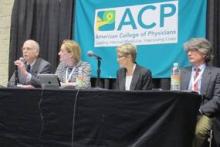ORLANDO – The American College of Physicians has unveiled a toolkit to improve referrals and care coordination between primary care physicians and specialists.
The High Value Care Coordination Toolkit also aims to eliminate waste and duplicative care and create more efficiency in care delivery.
The toolkit is available on the ACP’s website and was developed by the group’s Council of Subspecialty Societies and patient advocacy groups. The ACP also received input from a number of specialty societies, including the American Academy of Neurology, the American College of Cardiology, the American College of Rheumatology, the American Gastroenterological Association, the American Society of Hematology, the Endocrine Society, and the Society of Hospital Medicine.
"Physicians need specific information to do their jobs effectively," said Dr. Molly Cooke, the outgoing president of the ACP, in a statement. "The High Value Care Coordination Toolkit facilitates clear communication between primary care and subspecialist practices so that doctors can provide seamless, coordinated, and quality care to their patients."
Dr. Charles Cutler, immediate past chair of the ACP Board of Regents, said that he frequently heard from frustrated specialists who felt that referring primary care doctors had not given them enough information about the patient who was being referred.
"This is not a trivial problem, it’s something that drives both the medical subspecialists crazy and the primary care doctor like myself," said Dr. Cutler. "Because, on both sides, the information isn’t moving back and forth."
The toolkit creates a roadmap, he said. It includes five components:
• A checklist of information to include in a generic referral to a subspecialist practice.
• A checklist of information to include in a subspecialist’s response to a referral request.
• Pertinent data sets reflecting specific information – in addition to that found on a generic referral request – to include in a referral for a number of specific common conditions to help ensure an effective and high-value engagement.
• Model care coordination agreement templates between primary care and subspecialty practices, and between a primary care practice and hospital care team.
• An outline of recommendations to physicians on preparing a patient for a referral in a patient- and family-centered manner.
The data sets were developed with the medical specialty societies and can come in very useful, said Dr. Cooke, who has been using the toolkit in her practice at the University of California, San Francisco.
Dr. Carol Greenlee, vice chair of the ACP’s Council of Subspecialty Societies and an endocrinologist in Grand Junction, Colo., also said that she had been using the toolkit with physicians who were in her independent practice association (IPA).
"It’s easy when we’re integrated," said Dr. Greenlee, who helped develop the toolkit. For physicians who work outside her IPA, she said she sent letters outlining what she would like from doctors who made referrals to her. She said the vast majority responded, and now she gets great clinical questions and data on the patients who come in. And the patients come in prepared, Dr. Greenlee added.
She recommended that primary care physicians ask specialists who they work with what they’d like to see. "It doesn’t have to be a contract," she said.
Care coordination would be more crucial as health care moved to accountable care organizations and payment arrangements that were either true capitation or something similar, noted Dr. Bruce Leff, chair of the ACP’s Council of Subspecialty Societies. "There will be very strong positive incentives to be more efficient," said Dr. Leff, a geriatrician at Johns Hopkins University, Baltimore. "Efficiency is not just dollars. It’s physician time and patient time."
The documents offered in the toolkit "are really well thought–through guides," said Dr. Leff, adding that he believed that they could "save medical systems a lot of time and effort."
On Twitter @aliciaault


